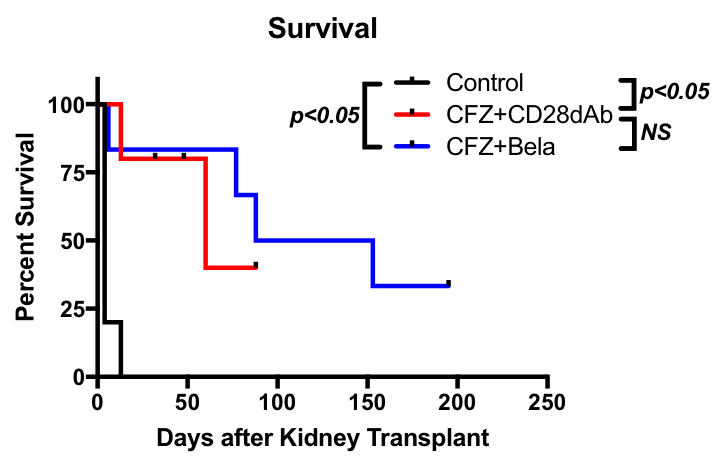Dual Targeting Desensitization with Carfilzomib Plus Lulizumab Significantly Prolongs Kidney Transplant Survival in Allosensitized Nonhuman Primates
Department of Surgery, Duke University Medical Center, Durham, NC
Meeting: 2019 American Transplant Congress
Abstract number: 264
Keywords: Sensitization
Session Information
Session Name: Concurrent Session: Immunosuppression Preclinical Studies
Session Type: Concurrent Session
Date: Monday, June 3, 2019
Session Time: 2:30pm-4:00pm
 Presentation Time: 3:18pm-3:30pm
Presentation Time: 3:18pm-3:30pm
Location: Room 309
*Purpose: Sensitized patients are difficult to transplant due to pre-formed immunity against MHC antigens; thus, new strategies for desensitization are needed to improve outcomes in this population. We investigated a desensitization strategy combining carfilzomib (CFZ) with lulizumab (CD28dAb) in an allosensitized nonhuman primate (NHP) model of kidney transplantation.
*Methods: Five maximally MHC-mismatched pairs of NHPs were sensitized to each other with two sequential skin transplants. Individuals from each pair were randomized to receive either desensitization with once weekly treatments of CFZ (27mg/m2IV) plus CD28dAb (12.5mg/kg SC) over four weeks, or no desensitization (Control). Then, NHPs received a life-sustaining kidney transplant from the donor to which they were sensitized. Rhesus-specific antithymocyte globulin was used as induction therapy and immunosuppression maintained with tacrolimus, mycophenolate, and methylprednisolone.
*Results: T cell flow crossmatch analysis of serum from the CFZ+CD28dAb treated group demonstrated a significant reduction in donor specific antibody after desensitization (ΔMFI -708±83, p<0.05). There were no significant differences in the proportions of CD4+ and CD8+ T cells or CD20+ B cells in peripheral blood after desensitization. However, the proportion of Naive CD4+ T cells significantly increased by 10.6% (p<0.05) and Naive CD20+ B cells significantly increased by 14.1% after CFZ+CD28dAb desensitization (p<0.05). There were no significant changes in proportions of naive or memory T and B cells over the same period in control NHPs. Receptor occupancy of CD28dAb was evaluated by flow cytometry, showing that expression of CD28 on the surface of T cells was undetectable in the CFZ+CD28dAb group for 4 weeks after desensitization. Survival in the CFZ+CD28dAb group was significantly improved compared to the control group and similar to our experience using CFZ+Belatacept (see Figure). None of the CFZ+CD28dAb NHPs have shown any significant reactivation of CMV.
*Conclusions: Dual targeting desensitization with CFZ+CD28dAb leads to increased proportions of naive immune cells and improves allograft survival in allosensitized NHPs. This dual targeting regimen may translate into a clinical desensitization protocol to improve outcomes for highly sensitized transplant recipients.
To cite this abstract in AMA style:
Schroder PM, Schmitz R, Fitch Z, Ezekian B, Yoon J, Choi A, Barbas A, Leopardi F, Collins B, Kwun J, Knechtle SJ. Dual Targeting Desensitization with Carfilzomib Plus Lulizumab Significantly Prolongs Kidney Transplant Survival in Allosensitized Nonhuman Primates [abstract]. Am J Transplant. 2019; 19 (suppl 3). https://atcmeetingabstracts.com/abstract/dual-targeting-desensitization-with-carfilzomib-plus-lulizumab-significantly-prolongs-kidney-transplant-survival-in-allosensitized-nonhuman-primates/. Accessed March 5, 2026.« Back to 2019 American Transplant Congress

